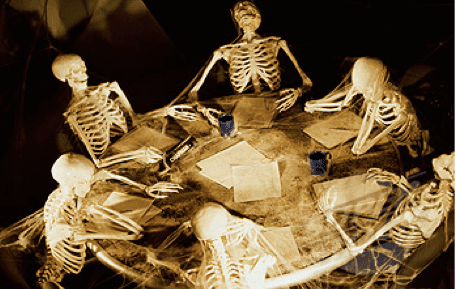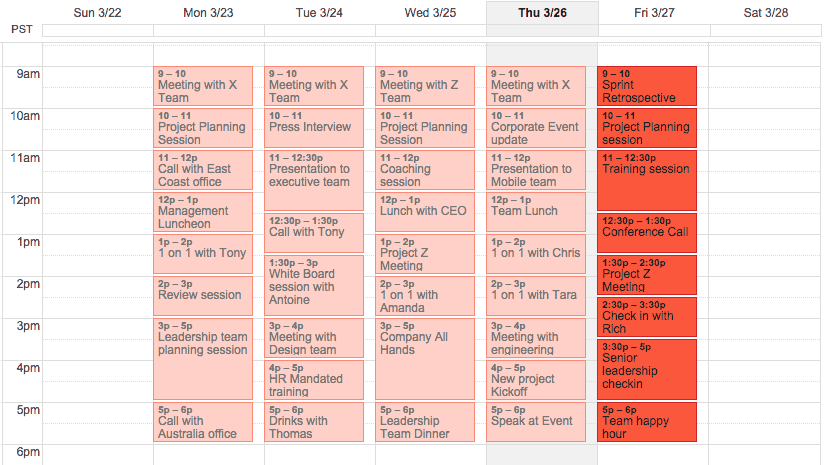In our culture, it's easy to glorify the workaholics that never take a break. I've heard friends half-exhausted, half like a badge of honor, talk about how they were in meetings from 9am to 5pm. But is that healthy? Is it the best use of your time?
It's very easy to fall into reactive management. It's easy to let your calendar look like this:
The problem is, all that time in meetings and running from emergency to emergency prevents you from having the space to do one of the other crucial things for managers and leaders: setting the vision and direction for your team.
Unfortunately, not all decisions are black and white; nor is every choice clear cut or inconsequential enough to not require deep thought (i.e.- should that be red or blue?). When you have to consider difficult directions for what the next project to prioritize is, how to structure your team, or the vision for your business, you need to give those ideas and your mind time to breathe, reflect, and observe.
And how do you do that? By taking a break.
Why Managers Should Take a Break
Bill Gates reads an hour before bed each night and takes a week a year to get away and just read and reflect alone. Mark Cuban reads over 3 hours a day. And after Arianna Huffington literally collapsed at work, she is now a huge proponent of meditation, more sleep, and disconnecting from your phone.
Now you're probably not a billion dollar mogul, so you can't make all the rules and do whatever you want, but that doesn't mean you can't make some changes.
If you want to get ahead and become a great leader of any kind. You need to invest in yourself, and the success of your team, by taking breaks. And in those breaks, the best thing you can do is read. As Mike Myatt writes in Hacking Leadership,
"Great leaders are like a sponge when it comes to the acquisition of knowledge, and the development of new skill sets. To the person, the best leaders I know are prolific readers. The most successful people I know consume written content at a pace that far exceeds that of the average person. If you want to improve your station in life, as well as the lives around you - read more."
So here's how you can do it, even if you're the only one at your company that tries it.
Take control of your calendar.
I've heard many say your inbox is really a to do list that other people get to add to. It's easy for your calendar to become the same thing. One invite after another can quickly have you facing death by meeting.

That means literally booking time to give yourself a mental break: meditate, read, reflect, or take a walk. If you book an hour or two for it each week, you can now ensure you actually have the time for a good mental break.
In particular, The 12 Week Year (a great book on planning big, long term goals and the vision for your life & career) recommends 2 kinds of time set aside for yourself:
- Strategic Blocks: Focus all your energy on: Strategic and Money-making activities.
- This is where you can reflect on the big vision and strategy you are in charge of.
- Breakout Blocks: Take time AWAY from work. Do something you wouldn't normally do.
- Take a walk, sit in nature, read a book, etc.
In both cases, it's about getting away from the usual distractions answering the phone, emails, fighting fires, for a sustained period of time. The authors recommend 3 hours for each every week, but that may not be feasible. Try to set aside 60-90 minutes for each though as you need time to get into the mindset and relax.
Get out of the noise and avoid distractions.
It's not really a break if you're getting interrupted constantly. It's also not a break if you cheat into your email. Put your phone down and turn off notifications or mark yourself as unavailable for this period of time. You need it.
The old saying, "Out of sight, out of mind" comes into play here. If you go where you can't be seen, you're much more likely to have the valuable time to focus and free your mind to think about other things uninterrupted. Just like doing great work can require getting into a flow, these breaks require the same unbroken focus on it.
I'm lucky to live in San Francisco, where there are parks all over the city. Some of my best ideas have come from sitting on a park bench and reading a book from this spot:

Let it flow, let it flow, let it flow.
It's amazing what happens when you get away from all the things that fill your daily grind. For me, I find that a short walk is super refreshing and after just a few pages of reading a book, my brain starts flowing with ideas without much prompting.
These ideas have been hugely beneficial. In no particular order, sitting in a park for an hour has led to:
- Inspiration for a better way to approach an onboarding problem.
- Catching myself making a bad product decision and determining a better solution.
- Helping get perspective on a challenging customer that saved a deal.
- Sparking the theme and key points for countless posts you've read here.
- Helping relieve stress on a tough day.
The fascinating thing is that I did not even go into these breaks with any of the outcomes above in mind; I didn't say, "I'm going to the park to come up with my next blog post." Instead, like when inspiration hits you in the shower, the best ideas come when you stop looking and let your subconscious surface them naturally.
If you need to get creative, you just can't grind it out. If you're struggling to relax your mind, then this talk from legendary comedian John Cleese will really help:

Take a chance and let the results speak for themselves.
Here's my challenge to you: Go on your calendar and find two slots the same time each week. Set aside 1 hour each to take these breaks for mental focus and creativity (aka- Breakout and Strategic blocks). Call them "Coffee Meetings", "Busy", "Project Coordination", or whatever it takes to make it so no one is looking for you for each hour or trying to schedule something else over it.
At the end of the month look back at what you've been able to learn and read in that time (quite possibly a whole book) and all the ideas you've noted that came to you then. I bet you'll find at least a few good ideas that more than pay for the time spent and you may just find yourself more calm and under control the rest of your time at work. Maybe you'll even then suggest others on your team to do the same.
Ready to take the challenge? Leave a comment if you've done it before, or come back next month. I'd love to hear how it went.





